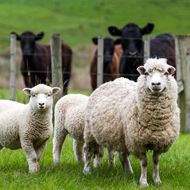
Farmers urged to review control measures
The risk of liver fluke infection in cattle and sheep during this autumn and winter will be high across all areas of Northern Ireland, the Agri-Food and Biosciences (AFBI) has confirmed.
The AFBI uses a forecasting system based on climate data to predict the risk of liver fluke infection in cattle and sheep.
Experts say that high levels of rainfall during the summer has provided ideal conditions for the survival of the immediate host, the snail Galba truncatula.
Warmer temperatures have also allowed the snails to breed and the fluke infections to develop within the snails, they add.
In light of the forecast, farmers in Northern Ireland are being urged to review their fluke control measures.
“Access to snail habitats (wet and poorly drained areas) should be reduced or sheep taken off the land and housed or moved to new clean pasture,” the experts write. “At this time of year, a product effective against immature and mature forms is needed.
“Use of such a product on out-wintered sheep once or twice in autumn and maybe in January, coupled with a treatment effective against adult flukes in early spring, should significantly reduce the fluke burden on individual farms.”
The AFBI adds that treatment of chronic (adult) infections in cattle as well as sheep during the winter or early spring is important to help reduce pasture contamination with fluke eggs.
“Use of an anthelmintic with activity mainly against adult flukes may be sufficient in these circumstances. However, the flukicide programme used has to be on a ‘know-your-farm’ basis and no one set of recommendations will cover all flocks or herds.”
Liver fluke disease can occur in either acute or chronic form. The acute form is caused by the migration of large numbers of immature flukes through the liver. This is often fatal and has serious implications for welfare.
Signs of severe infection include distended painful abdomen, anaemia and sudden death. In less severe cases, poor production and growth, together with reduced appetite and abdominal pain, are apparent.
Chronic liver fluke disease is more common than the acute form and occurs in both sheep and cattle. It usually occurs during the winter and spring, although infection can persist throughout the year.



 The Federation of Independent Veterinary Practices (FIVP) has announced a third season of its podcast, Practice Matters.
The Federation of Independent Veterinary Practices (FIVP) has announced a third season of its podcast, Practice Matters.